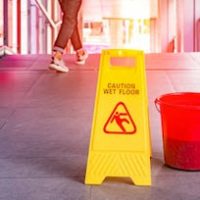What Are The Common Hazards Leading to a Slip and Fall Case

If you were injured on someone else’s property, you may have the right to compensation under premises liability law. You may be facing medical bills, the inability to return to work, lost wages, and even pain and suffering. If your slip and fall injury was due to a hazardous or dangerous condition on someone else’s property, they should have to pay for their negligence that resulted in your injuries and unexpected bills.
Slip and Fall Injuries
Slip and fall injuries can be catastrophic and cause serious injuries or even death. In fact, according to the Centers for Disease Control and Prevention, one-fifth of all falls result in a severe injury. You will need to prove the following four criteria if you are considering filing a claim in court for compensation involving your slip and fall injury.
- A hazard existed on the property of a business or private person.
- The business owner or property owner should have known (or had actual knowledge) that the dangerous condition or hazard existed on their property.
- The business owner or property owner should have removed the dangerous or hazardous condition, or at a minimum provided a warning to guests, invitees, or other persons legally allowed to be on the property.
- The hazardous or dangerous condition directly caused actual damages to you, including physical, emotional and financial damage.
Common Hazards Leading to Slip and Fall Injuries
While there is no established set of criteria to determine if a particular condition is considered legally hazardous or dangerous, there are some hazards that appear more often than others in slip and fall injury cases. The most common hazards are found in the following places: slippery sidewalks, grocery store isles with uncleaned spills, hospitals, hotels, parking lots with snow/ice or other hazards, apartment buildings, department stores, uneven pavements, staircases in disrepair, restaurants, and school.
Invitee, Licensee, and Trespasser
While any person may suffer injuries due to a hazardous condition, there are different levels of rights and responsibilities owed to persons who enter another person’s property.
- An invitee is typically a customer of a business. A property owner has a high duty to ensure that invitees are safe on their property.
- A licensee is typically a social guest at someone’s house or apartment that has been invited to be there. A property owner also has a high duty to ensure that licensees are safe on their property.
- Anyone who is not legally allowed to be on someone’s property is considered a trespasser. A property owner has no duty of care or responsibility towards a trespasser.
Let Us Help You Today
If you slipped and fell on someone’s property due to a hazardous or dangerous condition, we can help you build a strong personal injury case. Contact an experienced accident attorney at Roman & Roman today at 877-767-1032 or contact us online for a free consultation. We have offices in Clearwater, Hudson, and Tampa.
Resource:
cdc.gov/homeandrecreationalsafety/falls/adultfalls.html
https://www.romanromanlaw.com/injured-in-a-pedestrian-accident/


